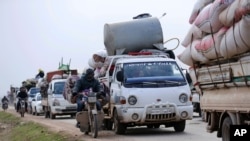U.N. agencies warn of a humanitarian catastrophe if the Turkish border crossing into northwest Syria is closed, preventing aid agencies from delivering life-saving assistance to millions of Syrians displaced by war.
In the next two weeks, the U.N. Security Council will decide whether the Bar al-Hawa crossing at the Turkish border will remain open. It is the last remaining border crossing through which humanitarian aid can be transported into Syria.
The World Food Program says the renewal of the U.N. resolution allowing the continued cross-border operation into northwest Syria through Turkey is critical. WFP spokesman Tomson Phiri says the lives of millions of people are at stake.
"Some 2.4 million people depend entirely on cross-border assistance for their basic needs, including food,” Phiri said. "WFP alone currently provides lifesaving support to about 1.35 million Syrians who are living in the northwest through monthly food rations. This accounts for about 80 percent of all cross-border food assistance.”
Phiri says WFP is continuing to pre-position food in the region for July and August in case the border resolution is not renewed on July 10.
Russia reportedly has indicated it might block the resolution. Russian Foreign Minister Sergey Lavrov has said Turkey’s role was not essential, and humanitarian aid could be delivered through alternate routes within Syria. U.S. Ambassador to the U.N. Linda Thomas-Greenfield has said there is no viable alternative to the crossing in Turkey.
World Health Organization spokesman Christian Lindmeier says people in northwest Syria are worse off today than they were 11 months ago when the cross-border issue was last reviewed by the Security Council. He warns the cessation of humanitarian supplies will lead to an increase in illnesses and deaths.
"If cross-border authorization is not renewed, it would not be possible to roll out reliable and predictable COVID-19 vaccinations to the population and other campaigns to vaccinate children, as well as other essential health activities, including lifesaving care for chronic non-communicable diseases,” Lindmeier said.
Lindmeier says crossline convoys, even if deployed regularly, would not replicate the size and scope of the cross-border operation. He says the U.N. has not managed to create the necessary conditions for that, noting no crossline convoys have yet traveled into northwest Syria from the capital, Damascus, in the last 11 months.




